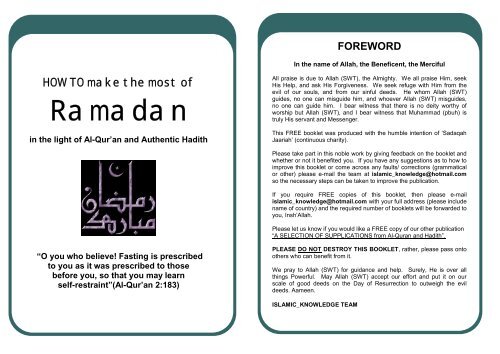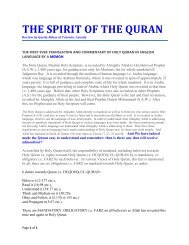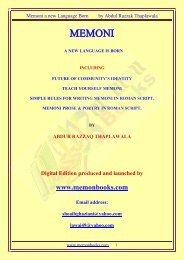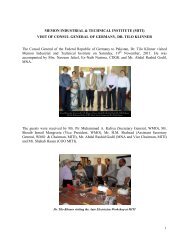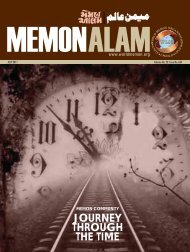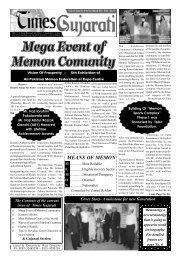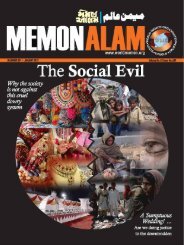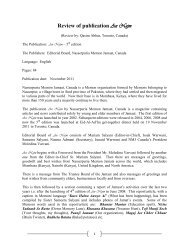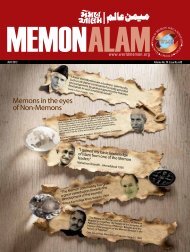How to make the most of Ramadan - Booklet in pdf - Memon Point
How to make the most of Ramadan - Booklet in pdf - Memon Point
How to make the most of Ramadan - Booklet in pdf - Memon Point
- No tags were found...
Create successful ePaper yourself
Turn your PDF publications into a flip-book with our unique Google optimized e-Paper software.
FOREWORDIn <strong>the</strong> name <strong>of</strong> Allah, <strong>the</strong> Beneficent, <strong>the</strong> MercifulHOW TO <strong>make</strong> <strong>the</strong> <strong>most</strong> <strong>of</strong><strong>Ramadan</strong><strong>in</strong> <strong>the</strong> light <strong>of</strong> Al-Qur’an and Au<strong>the</strong>ntic HadithAll praise is due <strong>to</strong> Allah (SWT), <strong>the</strong> Almighty. We all praise Him, seekHis Help, and ask His Forgiveness. We seek refuge with Him from <strong>the</strong>evil <strong>of</strong> our souls, and from our s<strong>in</strong>ful deeds. He whom Allah (SWT)guides, no one can misguide him, and whoever Allah (SWT) misguides,no one can guide him. I bear witness that <strong>the</strong>re is no deity worthy <strong>of</strong>worship but Allah (SWT), and I bear witness that Muhammad (pbuh) istruly His servant and Messenger.PaThis FREE booklet was produced with <strong>the</strong> humble <strong>in</strong>tention <strong>of</strong> ‘SadaqahJaariah’ (cont<strong>in</strong>uous charity).Please take part <strong>in</strong> this noble work by giv<strong>in</strong>g feedback on <strong>the</strong> booklet andwhe<strong>the</strong>r or not it benefited you. If you have any suggestions as <strong>to</strong> how <strong>to</strong>improve this booklet or come across any faults/ corrections (grammaticalor o<strong>the</strong>r) please e-mail <strong>the</strong> team at islamic_knowledge@hotmail.comso <strong>the</strong> necessary steps can be taken <strong>to</strong> improve <strong>the</strong> publication.If you require FREE copies <strong>of</strong> this booklet, <strong>the</strong>n please e-mailislamic_knowledge@hotmail.com with your full address (please <strong>in</strong>cludename <strong>of</strong> country) and <strong>the</strong> required number <strong>of</strong> booklets will be forwarded <strong>to</strong>you, Insh’Allah.Please let us know if you would like a FREE copy <strong>of</strong> our o<strong>the</strong>r publication“A SELECTION OF SUPPLICATIONS from Al-Quran and Hadith”.“O you who believe! Fast<strong>in</strong>g is prescribed<strong>to</strong> you as it was prescribed <strong>to</strong> thosebefore you, so that you may learnself-restra<strong>in</strong>t”(Al-Qur’an 2:183)PLEASE DO NOT DESTROY THIS BOOKLET, ra<strong>the</strong>r, please pass on<strong>to</strong>o<strong>the</strong>rs who can benefit from it.We pray <strong>to</strong> Allah (SWT) for guidance and help. Surely, He is over allth<strong>in</strong>gs Powerful. May Allah (SWT) accept our effort and put it on ourscale <strong>of</strong> good deeds on <strong>the</strong> Day <strong>of</strong> Resurrection <strong>to</strong> outweigh <strong>the</strong> evildeeds. Aameen.ISLAMIC_KNOWLEDGE TEAM
FASTING IN RAMADAN<strong>Ramadan</strong> (Sawm) is one <strong>of</strong> <strong>the</strong> five pillars <strong>of</strong> Islam and <strong>the</strong> n<strong>in</strong>th month <strong>of</strong><strong>the</strong> Muslim calendar. The mean<strong>in</strong>g <strong>of</strong> Sawm is <strong>to</strong> ‘absta<strong>in</strong>’. In this month,Allah Subhana Wa Taala (SWT) has made it compulsory that <strong>the</strong> fast<strong>in</strong>gbe observed by day, and he has made <strong>the</strong> ‘Taraweeh’ (<strong>Ramadan</strong> nightlyprayer) a ‘Sunnah’. Fast<strong>in</strong>g is <strong>to</strong> absta<strong>in</strong> from eat<strong>in</strong>g, dr<strong>in</strong>k<strong>in</strong>g, smok<strong>in</strong>g andconjugal relations from dawn till sunset.The Prophet (pbuh) said, “There is a gate <strong>in</strong> Paradise called Ar-Raiyan, and those who observe fast<strong>in</strong>g will enter through it on <strong>the</strong>Day <strong>of</strong> Resurrection and none except <strong>the</strong>m will enter through it”.(Sahih Bukhari, Volume 3, Book 31, Number 120)Dur<strong>in</strong>g <strong>the</strong> month <strong>of</strong> <strong>Ramadan</strong>, <strong>the</strong> Prophet (pbuh) used <strong>to</strong> apportion <strong>to</strong><strong>Ramadan</strong> a degree <strong>of</strong> worship that was not set aside <strong>to</strong> any o<strong>the</strong>r month.The Prophet (pbuh) spent his day <strong>in</strong> remembrance, recitation, learn<strong>in</strong>g andprovid<strong>in</strong>g advice and tra<strong>in</strong><strong>in</strong>g. His nights were spent <strong>in</strong> supplication andhumiliation un<strong>to</strong> Allah (SWT), seek<strong>in</strong>g His help, support, vic<strong>to</strong>ry andguidance.The Prophet (pbuh) said, “If someone draws near <strong>to</strong> Allah dur<strong>in</strong>g<strong>Ramadan</strong> with some good act he will be like one who fulfils anobliga<strong>to</strong>ry duty <strong>in</strong> ano<strong>the</strong>r month, and he who fulfils an obliga<strong>to</strong>ryduty <strong>in</strong> it will be like one who fulfils seventy obliga<strong>to</strong>ry duties <strong>in</strong>ano<strong>the</strong>r month”. (Tirmidhi Hadith 1965)Fast<strong>in</strong>g earns great reward as clearly stated <strong>in</strong> <strong>the</strong> above Hadith. WhenAllah (SWT) rewards an action as purely His, <strong>the</strong>n <strong>the</strong> reward is limitless.The Prophet (pbuh) said that Allah (SWT), <strong>the</strong> Majestic and <strong>the</strong>Exalted, said “All actions a human be<strong>in</strong>g does are for himself exceptfast<strong>in</strong>g. It is done for My sake, and I will give a reward for it and <strong>the</strong>reward <strong>of</strong> good deeds is multiplied 10 times”. (Sahih Bukhari Volume3, Book 31, Number 118, & Sahih Muslim, Book 006, Number 2564)<strong>Ramadan</strong> is an annual tra<strong>in</strong><strong>in</strong>g programme <strong>to</strong> refresh us for carry<strong>in</strong>g ou<strong>to</strong>ur duties <strong>to</strong>wards Allah (SWT). Fast<strong>in</strong>g develops self-control and helps us<strong>to</strong> overcome selfishness, greed, laz<strong>in</strong>ess and o<strong>the</strong>r faults. This month <strong>of</strong>patience gives us an opportunity <strong>to</strong> experience for ourselves what it is like<strong>to</strong> have an empty s<strong>to</strong>mach. This develops our feel<strong>in</strong>g for <strong>the</strong> poor andhungry people. Fast<strong>in</strong>g teaches us <strong>to</strong> control <strong>the</strong> love <strong>of</strong> comfort.Page 1If difficulty is experienced <strong>in</strong> fast<strong>in</strong>g, one should bear it cheerfully and notcompla<strong>in</strong>. Should we feel fatigued at <strong>the</strong> time <strong>of</strong> Taraweeh (<strong>Ramadan</strong> nightlyprayer), this <strong>to</strong>o should be borne with fortitude.It should also be borne <strong>in</strong> m<strong>in</strong>d that fast<strong>in</strong>g does not aim at <strong>in</strong>flict<strong>in</strong>gpunishment upon people or tak<strong>in</strong>g on unbearable burdens. The underly<strong>in</strong>gidea beh<strong>in</strong>d it is <strong>to</strong> teach moderation and spiritual discipl<strong>in</strong>e so that humantemptations may not become so wild and uncontrollable as <strong>to</strong> flout <strong>the</strong>commands <strong>of</strong> <strong>the</strong> Great Master. To be a true servant <strong>of</strong> Allah (SWT), it isessential that man should be able <strong>to</strong> conform his behaviour <strong>to</strong> <strong>the</strong> moral andspiritual discipl<strong>in</strong>e embodied <strong>in</strong> <strong>the</strong> Shari'ah <strong>of</strong> Islam. Fast<strong>in</strong>g is<strong>in</strong>dispensable for this moral and spiritual tra<strong>in</strong><strong>in</strong>g.The Prophet (pbuh) said, “When <strong>the</strong> month <strong>of</strong> <strong>Ramadan</strong> starts, <strong>the</strong>gates <strong>of</strong> mercy are opened and <strong>the</strong> gates <strong>of</strong> Hell are locked and <strong>the</strong>devils are cha<strong>in</strong>ed”. (Sahih Muslim, Book 006, Number 2361)The hadith below gives some very important po<strong>in</strong>ts regard<strong>in</strong>g <strong>Ramadan</strong>:The Prophet (pbuh) said "Fast<strong>in</strong>g is a shield or protection from <strong>the</strong> fireand from committ<strong>in</strong>g s<strong>in</strong>s. If one is fast<strong>in</strong>g, he should avoid sexualrelation with his wife and quarrell<strong>in</strong>g, and if somebody should fight orquarrel with him, he should say, 'I am fast<strong>in</strong>g.' There are two pleasuresfor <strong>the</strong> fast<strong>in</strong>g person, one at <strong>the</strong> time <strong>of</strong> break<strong>in</strong>g his fast, and o<strong>the</strong>r at<strong>the</strong> time when he will meet Allah; <strong>the</strong>n he will be pleased because <strong>of</strong>his fast<strong>in</strong>g." (Sahih Bukhari, Volume 3, Book 31, Number 128)In this month, <strong>the</strong> rebellious ‘Shayateen’ (Satans) are cha<strong>in</strong>ed, so as not <strong>to</strong>provoke those evils which <strong>the</strong>y normally do dur<strong>in</strong>g months o<strong>the</strong>r than<strong>Ramadan</strong>. A question may arise here that, when <strong>the</strong> ‘Shayateen’ arecha<strong>in</strong>ed, how it is that we still do see evil committed? The reply is that evilmay not necessarily be caused by <strong>the</strong> rebellious ‘Shayateen’. People havefor eleven months lived <strong>in</strong> obedience <strong>to</strong> ‘Shayateen’ whims and wishes, andso perform<strong>in</strong>g evil deeds <strong>in</strong>stigated by <strong>the</strong>m becomes second nature.Consequently, evil is be<strong>in</strong>g done <strong>in</strong> and out <strong>of</strong> <strong>Ramadan</strong>.Therefore <strong>the</strong> feel<strong>in</strong>gs and lessons we experience should stay with usthroughout <strong>the</strong> year. In Al-Qur’an, Muslims are commanded <strong>to</strong> fast so that<strong>the</strong>y may "become pious". This piety and devotion is especially felt dur<strong>in</strong>g<strong>Ramadan</strong>, but we all must strive <strong>to</strong> <strong>make</strong> <strong>the</strong> feel<strong>in</strong>gs and attitude stay withus dur<strong>in</strong>g our "normal" lives. That is <strong>the</strong> true goal and test <strong>of</strong> <strong>Ramadan</strong>.Page 2
The Prophet (pbuh) said, “Every servant <strong>of</strong> Allah who observes fast for aday <strong>in</strong> <strong>the</strong> way <strong>of</strong> Allah, Allah would remove, because <strong>of</strong> this day, hisface far<strong>the</strong>r from <strong>the</strong> Fire <strong>of</strong> Hell <strong>to</strong> <strong>the</strong> extent <strong>of</strong> seventy years'distance”. (Sahih Muslim, Book 006, Number 2570)Fast<strong>in</strong>g is <strong>the</strong> way <strong>to</strong> piety and <strong>the</strong> fear <strong>of</strong> God. Fast<strong>in</strong>g narrows <strong>the</strong> food andblood arteries. They are known <strong>to</strong> be canals <strong>of</strong> <strong>the</strong> devils, hence fast<strong>in</strong>greduces <strong>the</strong>ir <strong>in</strong>s<strong>in</strong>uation. It fur<strong>the</strong>r weakens carnal desires, thoughts andtemptations <strong>of</strong> disobedience.Fast<strong>in</strong>g enhances bodily health. It gets rid <strong>of</strong> contam<strong>in</strong>ated matter, eases <strong>the</strong>s<strong>to</strong>mach, purifies <strong>the</strong> blood, eases <strong>the</strong> work<strong>in</strong>g <strong>of</strong> <strong>the</strong> heart, brightens <strong>the</strong>spirit, ref<strong>in</strong>es <strong>the</strong> soul and discipl<strong>in</strong>es <strong>the</strong> character. When an <strong>in</strong>dividual fasts,his soul is humbled and his carnal desires are dispelled. There is a greatreward for fast<strong>in</strong>g, as it shows a Muslim obey<strong>in</strong>g Allah (SWT) and submitt<strong>in</strong>g<strong>to</strong> His command.FASTING IN THE MONTH OF SHA'BANThe Prophet (pbuh) used <strong>to</strong> fast till one would say he would never s<strong>to</strong>pfast<strong>in</strong>g, and he would abandon fast<strong>in</strong>g till one would say he would neverfast. I never saw <strong>the</strong> Prophet fast<strong>in</strong>g for a whole month except <strong>the</strong>month <strong>of</strong> <strong>Ramadan</strong>, and did not see him fast<strong>in</strong>g <strong>in</strong> any month more than<strong>in</strong> <strong>the</strong> month <strong>of</strong> Shaban.(Sahih Bukhari, Volume 3, Book 31, Number 190)The Prophet (pbuh) has <strong>to</strong>ld us not <strong>to</strong> fast one or two days before <strong>Ramadan</strong>as we need <strong>to</strong> keep our physical and spiritual strength <strong>to</strong> <strong>make</strong> <strong>the</strong> <strong>most</strong> <strong>of</strong>this blessed month.The Prophet (pbuh) said, "None <strong>of</strong> you should fast a day or two before<strong>the</strong> month <strong>of</strong> <strong>Ramadan</strong> unless he has habit <strong>of</strong> fast<strong>in</strong>g (Nawafil) (and ifhis fast<strong>in</strong>g co<strong>in</strong>cides with that day) <strong>the</strong>n he can fast that day."(Bukhari, Volume 3, Book 31, No.138, Muslim, Book 006, Number 2382)We should try our best <strong>to</strong> keep some fasts <strong>in</strong> Shaban.The Prophet (pbuh) is reported <strong>to</strong> have asked one <strong>of</strong> <strong>the</strong> Companions“Did you fast <strong>in</strong> <strong>the</strong> middle <strong>of</strong> Sha'ban?” The Companion replied, “No”.Thereupon <strong>the</strong> Prophet (pbuh) said: “If you did not observe fast, <strong>the</strong>nyou should observe fast for two days”.(Sahih Muslim, Book 006, Number 2607)Page 3THE WISDOM BEHIND FASTINGFast<strong>in</strong>g <strong>in</strong> <strong>Ramadan</strong> is not merely physically restra<strong>in</strong><strong>in</strong>g from <strong>the</strong> obvious foodand dr<strong>in</strong>k, but <strong>the</strong> <strong>to</strong>tal commitment <strong>of</strong> <strong>the</strong> servant's body and soul <strong>to</strong> <strong>the</strong> letterand spirit <strong>of</strong> fast<strong>in</strong>g.1) The fast <strong>of</strong> <strong>the</strong> self, means <strong>to</strong> be free from all carnal desires.2) The fast <strong>of</strong> m<strong>in</strong>d is avoid<strong>in</strong>g thoughts about th<strong>in</strong>gs o<strong>the</strong>r than Allah (SWT).3) The fast <strong>of</strong> <strong>the</strong> hand is not <strong>to</strong>uch<strong>in</strong>g/tak<strong>in</strong>g what does not belong <strong>to</strong> it.4) The fast <strong>of</strong> <strong>the</strong> nose means not sniff<strong>in</strong>g or smell<strong>in</strong>g unlawful th<strong>in</strong>gs.5) The fast <strong>of</strong> <strong>the</strong> feet is not go<strong>in</strong>g places where s<strong>in</strong>ful acts are propagated.6) The fast <strong>of</strong> <strong>the</strong> eye is <strong>to</strong> prevent it from see<strong>in</strong>g forbidden th<strong>in</strong>gs.Allah (SWT) says <strong>in</strong> Al-Qur’an, “Tell <strong>the</strong> believ<strong>in</strong>g men <strong>to</strong> lower <strong>the</strong>irgaze and be m<strong>in</strong>dful <strong>of</strong> <strong>the</strong>ir chastity; this will be <strong>most</strong> conducive <strong>to</strong><strong>the</strong>ir purity. And tell <strong>the</strong> believ<strong>in</strong>g women <strong>to</strong> lower <strong>the</strong>ir gaze and bem<strong>in</strong>dful <strong>of</strong> <strong>the</strong>ir chastity, and not display <strong>the</strong>ir charms (<strong>in</strong> public) beyondwhat may (decently) be apparent <strong>the</strong>re<strong>of</strong>, hence let <strong>the</strong>m draw <strong>the</strong>irhead-cover<strong>in</strong>g over <strong>the</strong>ir bosoms”. (Al-Qur’an 24:30-31)7) The fast <strong>of</strong> <strong>the</strong> <strong>to</strong>ngue is guard<strong>in</strong>g aga<strong>in</strong>st ly<strong>in</strong>g, backbit<strong>in</strong>g, slander<strong>in</strong>g,revil<strong>in</strong>g, abus<strong>in</strong>g o<strong>the</strong>rs, curs<strong>in</strong>g, <strong>in</strong>decent conversation, swear<strong>in</strong>g and falseevidence. The Prophet (pbuh) said: “A Muslim is he from whose <strong>to</strong>ngue andhands o<strong>the</strong>r Muslims are safe”.The Prophet (pbuh) said, “"Whoever does not give up forged speechand evil actions, Allah is not <strong>in</strong> need <strong>of</strong> his leav<strong>in</strong>g his food and dr<strong>in</strong>k(i.e. Allah will not accept his fast<strong>in</strong>g.)"(Sahih Bukhari, Volume 3, Book 31, Number 127)8) The fast <strong>of</strong> <strong>the</strong> ears is not <strong>to</strong> listen <strong>to</strong> idle talk, gossip, lyrics and notes thatconta<strong>in</strong> obscene and <strong>in</strong>decent th<strong>in</strong>gs. Listen<strong>in</strong>g <strong>to</strong> Al-Qur’an bears <strong>the</strong> fruit <strong>of</strong>faith, guidance, light and prosperity. It fills <strong>the</strong> heart with wisdom, tranquillity,<strong>in</strong>timacy and contentment. It is a source <strong>of</strong> protection from <strong>the</strong> dangerous,deviant and s<strong>in</strong>ful thoughts.9) The fast <strong>of</strong> <strong>the</strong> heart means cast<strong>in</strong>g out from it <strong>the</strong> love <strong>of</strong> worldly th<strong>in</strong>gsand by empty<strong>in</strong>g it <strong>of</strong> all corrupt material such as, false beliefs, evilsuggestions, filthy <strong>in</strong>tentions and degenerate thoughts.Page 4
The Prophet (pbuh) said: “There is a piece <strong>of</strong> flesh <strong>in</strong> <strong>the</strong> body if itbecomes good (reformed) <strong>the</strong> whole body becomes good but if it getsspoilt <strong>the</strong> whole body gets spoilt and that is <strong>the</strong> heart.”(Sahih Bukhari, Volume 1, Book 2, Number 49)The believer’s heart absta<strong>in</strong>s from pride and egotism as <strong>the</strong>se traits breaks itsfast. Egotism is when <strong>the</strong> <strong>in</strong>dividual sees himself as perfect and better thano<strong>the</strong>rs. The cure for this self-importance is <strong>to</strong> look at one’s faults and shortcom<strong>in</strong>gs,thousands <strong>of</strong> s<strong>in</strong>s and misdeeds that one has committed, wrongs tha<strong>to</strong>ne has done and forgotten, but knowledge <strong>of</strong> which are with Allah (SWT).Allah (SWT) says <strong>in</strong> Al-Qur’an, “do <strong>the</strong>y, perchance, envy o<strong>the</strong>r people forwhat God has granted <strong>the</strong>m out <strong>of</strong> his bounty?” (Al-Qur’an 4:54)The heart <strong>of</strong> <strong>the</strong> believer fasts and absta<strong>in</strong>s from envy as envy lowersrighteous deeds and s<strong>to</strong>ps its progress <strong>to</strong>ward Allah (SWT).AVOIDANCE OF THINGS THAT CONTRADICT SPIRIT OF FASTINGWHAT DOES AND DOESN’T BREAK THE FASTThe Prophet (pbuh) said:” Nei<strong>the</strong>r vomit<strong>in</strong>g, nor emission, nor cupp<strong>in</strong>gbreaks <strong>the</strong> fast.” (Abu Dawud, Book 13, Number 2370)There are certa<strong>in</strong> th<strong>in</strong>gs that break a person’s fast, <strong>the</strong> <strong>most</strong> obvious be<strong>in</strong>gthose th<strong>in</strong>gs that are explicitly forbidden dur<strong>in</strong>g fast<strong>in</strong>g, i.e. eat<strong>in</strong>g, dr<strong>in</strong>k<strong>in</strong>g,sexual relations and dur<strong>in</strong>g menstruation, for females. <strong>How</strong>ever, if one eatssometh<strong>in</strong>g forgetfully, <strong>the</strong>n this fast does not have <strong>to</strong> be made up:The Prophet said, "If somebody eats someth<strong>in</strong>g forgetfully while he isfast<strong>in</strong>g, <strong>the</strong>n he should complete his fast, for Allah has made him eat anddr<strong>in</strong>k." (Sahih Bukhari, Volume 3, Book 31, Number 154)In terms <strong>of</strong> apply<strong>in</strong>g medic<strong>in</strong>e, <strong>the</strong>re is noth<strong>in</strong>g which prevents us from us<strong>in</strong>gsuch as long as it is not entered through <strong>the</strong> mouth or nose:The Prophet (pbuh) said, "I have a compla<strong>in</strong>t <strong>in</strong> my eyes, so may I applycollyrium while I am fast<strong>in</strong>g?" He replied, "Yes." (Tirmidhi Hadith 2010)Allah (SWT) says <strong>in</strong> Al-Qur’an, “Eat and dr<strong>in</strong>k (freely), but do not waste:verily, He does not love <strong>the</strong> wasteful!” (Al-Qur’an 7:31)Some people who fast waste money on meals both at <strong>the</strong> beg<strong>in</strong>n<strong>in</strong>g and <strong>the</strong>break<strong>in</strong>g <strong>of</strong> <strong>the</strong> fast <strong>in</strong> <strong>Ramadan</strong>. They prepare food enough for a crowd <strong>of</strong>people consist<strong>in</strong>g <strong>of</strong> numerous dishes. Then, at <strong>the</strong> end <strong>of</strong> this, <strong>the</strong>y only eat alittle and throw <strong>the</strong> rema<strong>in</strong>der <strong>in</strong><strong>to</strong> <strong>the</strong> refuse. This is contrary <strong>to</strong> <strong>the</strong> greatteach<strong>in</strong>gs <strong>of</strong> Islam.There are o<strong>the</strong>r people who fill <strong>the</strong> s<strong>to</strong>mach with delicious foods at “Sehri”, sothat one does not feel hungry until “Iftaar”. When open<strong>in</strong>g <strong>the</strong>ir fast, <strong>the</strong>y<strong>in</strong>dulge <strong>in</strong> excessive eat<strong>in</strong>g and dr<strong>in</strong>k<strong>in</strong>g. This however, defeats <strong>the</strong> purpose <strong>of</strong>fast<strong>in</strong>g, one <strong>of</strong> which is <strong>to</strong> empty <strong>the</strong> s<strong>to</strong>mach <strong>of</strong> all contam<strong>in</strong>ated material byreduc<strong>in</strong>g <strong>the</strong> <strong>in</strong>take <strong>of</strong> food.Many people spend <strong>the</strong>ir fast<strong>in</strong>g hours sleep<strong>in</strong>g. As a result it seems as if <strong>the</strong>ydid not fast. The wisdom <strong>of</strong> fast<strong>in</strong>g is that <strong>the</strong> one who fasts should experiencepangs <strong>of</strong> hunger and savour thirst <strong>in</strong> order <strong>to</strong> ga<strong>in</strong> <strong>the</strong> pleasure <strong>of</strong> Allah (SWT).There are also people who <strong>make</strong> no effort <strong>to</strong> do good by giv<strong>in</strong>g charity. Theydo not honour <strong>the</strong>ir tables by allow<strong>in</strong>g o<strong>the</strong>rs <strong>to</strong> break <strong>the</strong>ir fast with <strong>the</strong>m.A certa<strong>in</strong> degree <strong>of</strong> affection is allowed between spouses as this Hadith shows:'A'isha reported, “The Prophet (pbuh) used <strong>to</strong> kiss me while observ<strong>in</strong>gfast and who among you can control his desire as <strong>the</strong> Prophet (pbuh)could control his desire.” (Sahih Muslim, Book 006, Number 2438)<strong>How</strong>ever, <strong>the</strong> Prophet (pbuh) did report <strong>the</strong> follow<strong>in</strong>g Hadith:A man asked <strong>the</strong> Prophet (pbuh) whe<strong>the</strong>r one who was fast<strong>in</strong>g couldembrace (his wife) and he gave him permission; but when ano<strong>the</strong>r mancame <strong>to</strong> him, and asked him, he forbade him. The one <strong>to</strong> whom he gavepermission was an old man and <strong>the</strong> one whom he forbade was a youth.(Abu Dawud, Book 13, Number 2381)WHAT A SICK MAN DOES WHEN FASTINGThere are some situations when a person can break <strong>the</strong>ir fast."If a man succumbs <strong>to</strong> an illness which <strong>make</strong>s fast<strong>in</strong>g very difficult forhim and exhausts him and wears him out, he can break his fast.(Muwatta, Book 18, Number 18.15.41)Page 5 Page 6
FASTING WHILST TRAVELLINGHamza b<strong>in</strong> 'Amr Al-Aslami asked <strong>the</strong> Prophet, "Should I fast whiletravell<strong>in</strong>g?" The Prophet replied, "You may fast if you wish, and you maynot fast if you wish." (Sahih Bukhari, Volume 3, Book 31, Number 164)Fast<strong>in</strong>g whilst travell<strong>in</strong>g is optional, so <strong>the</strong>re is no s<strong>in</strong> on <strong>the</strong> one who choosesnot <strong>to</strong> fast whilst on a journey if <strong>the</strong>y feel that it will weaken <strong>the</strong>m. Allah (SWT)has allowed man not <strong>to</strong> fast, whilst travell<strong>in</strong>g because He knows that hisslaves may not be able <strong>to</strong> cope.Anas reported “We were with <strong>the</strong> Prophet (pbuh) on a journey. Some <strong>of</strong>us had been observ<strong>in</strong>g <strong>the</strong> fast and some <strong>of</strong> us had not been fast<strong>in</strong>g. Wegot down at a place on a hot day. Most <strong>of</strong> us had <strong>the</strong> cloth for shelter.There were also those amongst us who sheltered <strong>the</strong>mselves aga<strong>in</strong>st <strong>the</strong>rays <strong>of</strong> <strong>the</strong> sun with <strong>the</strong> help <strong>of</strong> <strong>the</strong>ir hands. The observers <strong>of</strong> <strong>the</strong> fast felldown (on account <strong>of</strong> weakness). Those who had not observed it got upand pitched tents and watered <strong>the</strong> mounts. Thereupon <strong>the</strong> Prophet(pbuh) said “The breakers <strong>of</strong> <strong>the</strong> fast have taken away <strong>the</strong> reward <strong>to</strong>day”.(Sahih Muslim, Book 006, Number 2484)RECITATION OF AL-QUR’AN DURING RAMADANAllah (SWT) says <strong>in</strong> Al-Qur’an, “<strong>Ramadan</strong> is <strong>the</strong> (month) <strong>in</strong> which wassent down Al-Qur'an, as a guide <strong>to</strong> mank<strong>in</strong>d, also clear (Signs) forguidance and judgement (Between right and wrong)”. (Al-Qur’an 2:185)The entire month <strong>of</strong> <strong>Ramadan</strong> is <strong>in</strong> essence a celebration <strong>of</strong> Al-Qur’an’srevelation, which is described as a “Guide and Mercy for those who dogood.” (Al-Qur’an 31:3). <strong>Ramadan</strong> celebrates God’s Mercy by which He senta guid<strong>in</strong>g light <strong>in</strong> Al-Qur’an that leads human life <strong>to</strong>wards <strong>the</strong> path <strong>of</strong> good andvirtue and protects <strong>the</strong> human soul from evil and vice. Al-Qur’an is life, spirit,salvation, happ<strong>in</strong>ess, reward and recompense. It is a div<strong>in</strong>e teach<strong>in</strong>g, aconstitution and eternal wisdom.Prophet (pbuh) said, “Read Al-Qur’an for surely it will be an <strong>in</strong>tercessorfor you on <strong>the</strong> Day <strong>of</strong> Judgement”. (Sahih Muslim Book 4 No 1757)In his f<strong>in</strong>al year, <strong>the</strong> Prophet (pbuh) recited <strong>the</strong> Al-Qur’an twice <strong>in</strong> <strong>Ramadan</strong>.Muslims should try <strong>to</strong> read <strong>the</strong> entire Al-Qur’an at least once dur<strong>in</strong>g <strong>Ramadan</strong>.Many o<strong>the</strong>rs read or recite Al-Qur’an dur<strong>in</strong>g Taraweeh Prayers (<strong>Ramadan</strong>nightly prayers), which are held only dur<strong>in</strong>g <strong>Ramadan</strong>, or <strong>in</strong> private late nightPrayers called Tahajjud.<strong>How</strong>ever <strong>the</strong> common practice <strong>the</strong>se days is that Taraweeh prayers arerushed <strong>in</strong> order <strong>to</strong> complete Al-Qur’an. This goes aga<strong>in</strong>st <strong>the</strong> teach<strong>in</strong>g <strong>of</strong>Islam as Allah (SWT) says <strong>in</strong> Al-Qur’an: “and recite Al-Qur’an <strong>in</strong> slow,measured rhythmic <strong>to</strong>nes.” (73:4). Comment<strong>in</strong>g on this Ibn Kathir says thismeans “recite it slowly, for that will help <strong>in</strong> understand<strong>in</strong>g Al-Qur’an andcontemplat<strong>in</strong>g it. This is how <strong>the</strong> Prophet (pbuh) used <strong>to</strong> recite”. Although it isdesirable <strong>to</strong> complete Al-Qur’an <strong>in</strong> <strong>Ramadan</strong> <strong>to</strong> follow <strong>the</strong> sunnah, it shouldbe read with understand<strong>in</strong>g and contemplation <strong>in</strong> order <strong>to</strong> draw closer <strong>to</strong> Allah(SWT) by <strong>in</strong>creas<strong>in</strong>g our guidance <strong>in</strong>sh’Allah.The Prophet (pbuh) said "Fast three days a month." 'Abdullah said, "Iam able <strong>to</strong> fast more than that." They kept on argu<strong>in</strong>g on this matter till<strong>the</strong> Prophet (pbuh) said, "Fast on alternate days, and recite <strong>the</strong> wholeQur'an once a month." 'Abdullah said, "I can recite more (<strong>in</strong> a month),"and <strong>the</strong> argument went on till <strong>the</strong> Prophet (pbuh) said, "Recite <strong>the</strong>Qur'an once each three days." (i.e. you must not recite <strong>the</strong> whole Qur'an<strong>in</strong> less than three days). (Sahih Bukhari, Volume 3, Book 31, No. 199)Therefore we are encouraged <strong>to</strong> read Al-Qur’an <strong>of</strong>ten but should not try <strong>to</strong>complete it <strong>in</strong> less than seven days as we should be learn<strong>in</strong>g from it andimplement<strong>in</strong>g Allah (SWT)’s commands and laws <strong>in</strong><strong>to</strong> our lives. Therefore weshould not just read it without mean<strong>in</strong>g.Muslims who cannot read Arabic well, should spend some time each daylisten<strong>in</strong>g <strong>to</strong> a tape or CD <strong>of</strong> Al-Qur’an be<strong>in</strong>g recited. Muslims consider<strong>Ramadan</strong> <strong>to</strong> be a good time <strong>to</strong> get <strong>in</strong><strong>to</strong> <strong>the</strong> habit <strong>of</strong> read<strong>in</strong>g at least some <strong>of</strong>Al-Qur’an or its translation every day, and if <strong>the</strong>y haven’t read ei<strong>the</strong>r <strong>of</strong> <strong>the</strong>mcover <strong>to</strong> cover, <strong>Ramadan</strong> is <strong>the</strong> time <strong>to</strong> do it.TARAWEEH PRAYERThe Prophet (pbuh) said: "Whoever observes night prayer <strong>in</strong> <strong>Ramadan</strong>as an expression <strong>of</strong> his faith and <strong>to</strong> seek reward from Allah, hisprevious s<strong>in</strong>s will be blotted out”.(Sahih Bukhari, Volume 3, Book 32, Number 226)Page 7 Page 8
Muslims should dur<strong>in</strong>g this month <strong>make</strong> an extra effort <strong>to</strong> perform TaraweehPrayer (<strong>Ramadan</strong> nightly prayer), preferably <strong>in</strong> congregation. Taraweeh has aspecial merit over o<strong>the</strong>r nights. Taraweeh is part <strong>of</strong> physical and spiritualtra<strong>in</strong><strong>in</strong>g, for its observation soon after Iftaar <strong>in</strong>sures timely and proper digestion<strong>of</strong> food. There are also spiritual rewards await<strong>in</strong>g <strong>the</strong> observers <strong>of</strong> this prayer. Itmust be mentioned here that Taraweeh prayers, although very beneficial <strong>to</strong>read, are not compulsory as stated by <strong>the</strong> Prophet (pbuh) himself.'A'isha reported that Prophet (pbuh) prayed one night <strong>in</strong> <strong>the</strong> mosque andpeople also prayed along with him. He <strong>the</strong>n prayed on <strong>the</strong> follow<strong>in</strong>g nightand <strong>the</strong>re were many persons. Then on <strong>the</strong> third or fourth night (manypeople) ga<strong>the</strong>red <strong>the</strong>re, but <strong>the</strong> Prophet (pbuh) did not come out <strong>to</strong> <strong>the</strong>m(for lead<strong>in</strong>g <strong>the</strong> Tarawih prayer). When it was morn<strong>in</strong>g he said: “I saw whatyou were do<strong>in</strong>g, but I desisted <strong>to</strong> come <strong>to</strong> you (and lead <strong>the</strong> prayer) for Ifeared that this prayer might become obliga<strong>to</strong>ry for you”. (He <strong>the</strong> narra<strong>to</strong>r)said: It was <strong>the</strong> month <strong>of</strong> <strong>Ramadan</strong>.(Sahih Bukhari, Volume 2, Book 13, Number 46)CHARITY IN RAMADANIt is reported that “The Prophet (pbuh) was naturally <strong>the</strong> <strong>most</strong> generous <strong>of</strong>people and he used <strong>to</strong> be more generous than ever <strong>in</strong> <strong>the</strong> month <strong>of</strong><strong>Ramadan</strong>”. (Sahih Bukhari, Volume 3, Book 31, Number 126)Because <strong>of</strong> <strong>the</strong> great reward for feed<strong>in</strong>g a fast<strong>in</strong>g person, <strong>in</strong> many places‘Iftaar’(<strong>the</strong> break<strong>in</strong>g <strong>of</strong> <strong>the</strong> fast at sunset) is served <strong>in</strong> mosques, with <strong>the</strong>food donated or brought by <strong>in</strong>dividuals <strong>to</strong> share. This contact between <strong>the</strong>various levels <strong>of</strong> society helps <strong>to</strong> create a real bond <strong>of</strong> bro<strong>the</strong>rhood <strong>in</strong> <strong>the</strong>Muslim community.The Prophet (pbuh) said, “When a man dies all <strong>of</strong> his deeds come <strong>to</strong>an end, except for three: ongo<strong>in</strong>g charity, knowledge which isbenefited from, or pious <strong>of</strong>fspr<strong>in</strong>g who pray for <strong>the</strong>m.”(Sahih Muslim, Book 013, Number 4005)The Prophet (pbuh) enjo<strong>in</strong>ed Zakaah on those who fast <strong>to</strong> purify <strong>the</strong>mfrom any <strong>in</strong>decent act or deeds. It is a sort <strong>of</strong> purification <strong>of</strong> <strong>the</strong> soul on <strong>the</strong><strong>in</strong>dividual level, a cure aga<strong>in</strong>st miserl<strong>in</strong>ess, and a social safety net. Therich are obliged <strong>to</strong> come <strong>in</strong> contact with <strong>the</strong> poor and <strong>the</strong> poor with <strong>the</strong>even less fortunate. Zakaah provides for <strong>the</strong> poor and spares <strong>the</strong>m <strong>the</strong>humiliation <strong>of</strong> ask<strong>in</strong>g for charity.HOW THE BLESSED MONTH RAMADAN STARTSThe Prophet (pbuh) said, “Do not fast till you see <strong>the</strong> new moon, anddo not break fast till you see it, but if <strong>the</strong> wea<strong>the</strong>r is cloudy calculateabout it.” (Sahih Muslim, Book 006, Number 2363 )Allah (SWT) has given you, so Muslims should try <strong>to</strong> give generously <strong>in</strong><strong>Ramadan</strong>, both Sadaqah (optional charity) and Zakaah (obliga<strong>to</strong>ry charity).Every time a servant <strong>of</strong> Allah (SWT) gives someth<strong>in</strong>g <strong>in</strong> charity Allah (SWT)eases his physical, spiritual and mental conditions. He expands for him Hissustenance. Sadaqah does not only have <strong>to</strong> be money. It can also be a gooddeed—such as help<strong>in</strong>g ano<strong>the</strong>r person—done for <strong>the</strong> sake <strong>of</strong> Allah (SWT) andwithout expect<strong>in</strong>g any reward from <strong>the</strong> person. Even a smile is consideredcharity <strong>in</strong> Islam. Most Muslims pay <strong>the</strong>ir Zakaah dur<strong>in</strong>g <strong>Ramadan</strong> because <strong>the</strong>reward is so much greater <strong>in</strong> that month. Wealth is like water, if its flow isobstructed it becomes brackish, and if it flows, it becomes sweet and fresh.The Prophet (pbuh) said “This is <strong>the</strong> month <strong>of</strong> charity <strong>in</strong> which believer’ssustenance is <strong>in</strong>creased. Whosoever feeds a fast<strong>in</strong>g person or gives afast<strong>in</strong>g person a s<strong>in</strong>gle date or a sip <strong>of</strong> water, <strong>to</strong> break <strong>the</strong> fast, for him<strong>the</strong>re shall be forgiveness <strong>of</strong> his s<strong>in</strong>s and he will be saved from <strong>the</strong> fire <strong>of</strong>hell, and for him shall be <strong>the</strong> same reward as for him (whom he fed)”.It is very important <strong>to</strong> start <strong>the</strong> best month <strong>in</strong> <strong>the</strong> Islamic year correctly. It isvery clear <strong>in</strong> Al-Qur’an and Sunnah that we should look for <strong>the</strong> moon and ifit is sighted <strong>the</strong>n <strong>the</strong> month has started. It is also clear that we should lookfor <strong>the</strong> moon <strong>in</strong> our own country <strong>of</strong> residence as stated <strong>in</strong> <strong>the</strong> hadith below:Umm Fadl said, “I saw <strong>the</strong> new moon (<strong>of</strong> <strong>Ramadan</strong>) on Friday”.Abdullah b. 'Abbas (Allah be pleased with him) asked me (about <strong>the</strong>new moon <strong>of</strong> <strong>Ramadan</strong>) and said “When did you see it?” I said “Wesaw it on <strong>the</strong> night <strong>of</strong> Friday”. He said “Did you see it yourself?” Isaid “Yes” and <strong>the</strong> people also saw it and <strong>the</strong>y observed fast andMu'awiya also observed fast, whereupon he said “But we saw it onSaturday night. So we would cont<strong>in</strong>ue <strong>to</strong> observe fast till wecomplete thirty (fasts) or we see it (<strong>the</strong> new moon <strong>of</strong> Shawwal)”. Isaid “Is <strong>the</strong> sight<strong>in</strong>g <strong>of</strong> <strong>the</strong> moon by Mu'awiya not valid for you?” Hesaid “No, this is how The Prophet (pbuh) has commanded us”.(Sahih Muslim, Book 006, Number 2391)(Tirmidhi Hadith 1965)Page 9 Page 10
ETTIQUETTES OF RAMADANThe Prophet (pbuh) said “He who does not determ<strong>in</strong>e <strong>to</strong> fast beforedawn does not fast”. (Abu Dawud, Book 13, Number 2448)We should try our best <strong>to</strong> get up for Sehri.The Prophet (pbuh) said, “Eat a little before dawn (Sehri) as <strong>the</strong>re isbless<strong>in</strong>gs <strong>in</strong> tak<strong>in</strong>g meal at that time.”(Sahih Muslim, Book 006, Number 2412)Many people are deprived <strong>of</strong> this great bless<strong>in</strong>g because <strong>of</strong> <strong>the</strong>ir ownlaz<strong>in</strong>ess. Even if <strong>the</strong>re is no food, <strong>the</strong>n one date should be eaten or a dr<strong>in</strong>k <strong>of</strong>water taken. The period before dawn is considered blessed because it is <strong>in</strong><strong>the</strong> last third <strong>of</strong> <strong>the</strong> night, <strong>the</strong> time <strong>of</strong> div<strong>in</strong>e descent and forgiveness. It isano<strong>the</strong>r special time when du’as are accepted.Some time should be left after tak<strong>in</strong>g <strong>the</strong> suhoor and before <strong>the</strong> Fajr adhan /prayer:"We <strong>to</strong>ok <strong>the</strong> suhur with <strong>the</strong> Prophet (pbuh) . Then he s<strong>to</strong>od for <strong>the</strong>prayer." I asked, "What was <strong>the</strong> <strong>in</strong>terval between <strong>the</strong> suhur and <strong>the</strong>Adhan?" He replied, "The <strong>in</strong>terval was sufficient <strong>to</strong> recite fifty verses <strong>of</strong><strong>the</strong> Quran." (Sahih Bukhari, Volume 3, Book 31, Number 144)It is also narrated that even when <strong>the</strong> Fajr adhan was made, it was notnecessarily <strong>the</strong> time <strong>to</strong> s<strong>to</strong>p eat<strong>in</strong>g because <strong>the</strong> true dawn arises when <strong>the</strong>streaks <strong>of</strong> <strong>the</strong> whiteness <strong>of</strong> dawn are horizontal. <strong>How</strong>ever <strong>the</strong>se days this isdifficult <strong>to</strong> ascerta<strong>in</strong> <strong>in</strong> some countries and <strong>in</strong> <strong>the</strong>se circumstances we shouldkeep enough time <strong>to</strong> eat <strong>to</strong> be confident that we are not eat<strong>in</strong>g when dawnappears.The Prophet (pbuh) said, “The adhan <strong>of</strong> Bilal may not mislead you withregard <strong>to</strong> your food at <strong>the</strong> commencement <strong>of</strong> <strong>the</strong> fast, nor <strong>the</strong> vertical(streaks) <strong>of</strong> whiteness <strong>in</strong> <strong>the</strong> horizon (for it is an <strong>in</strong>dication <strong>of</strong> falsedawn). You should s<strong>to</strong>p eat<strong>in</strong>g (food) till (<strong>the</strong> whiteness) spreads like it.Hammad narrated it and with <strong>the</strong> gesture <strong>of</strong> his band he expla<strong>in</strong>ed, <strong>the</strong>horizontal position (<strong>of</strong> <strong>the</strong> streaks <strong>of</strong> light).”(Sahih Muslim, Book 006, Number 2409)We should hasten <strong>to</strong> break our fasts.The Prophet (pbuh) said, “The people will rema<strong>in</strong> on right path as long as<strong>the</strong>y hasten break<strong>in</strong>g <strong>of</strong> <strong>the</strong> fast (Iftaar). (Sahih Bukhari, Volume 3, Book31, Number 178 & Muslim, Book 006, Number 2417)To eat dates <strong>to</strong> break one’s fast is a Sunnah.The Prophet (pbuh) said “When one <strong>of</strong> you is fast<strong>in</strong>g, he should break hisfast with dates, but if he cannot get any, <strong>the</strong>n (he should break his fast)with water, for water is purify<strong>in</strong>g”. (Abu Dawud, Book 13, Number 2348)It is also very important that we do not delay <strong>the</strong> Maghrib salah unnecessarilyand pray soon after break<strong>in</strong>g <strong>the</strong> fast.Abu 'Atiyya reported “I and Misruq went <strong>to</strong> 'A'isha (Allah be pleased withher) and Masruq said <strong>to</strong> her “There are two persons among <strong>the</strong>Companions <strong>of</strong> Muhammad (pbuh) none <strong>of</strong> whom abandons <strong>the</strong> good, bu<strong>to</strong>ne <strong>of</strong> <strong>the</strong>m hastens <strong>to</strong> observe sunset prayer and break <strong>the</strong> fast, and <strong>the</strong>o<strong>the</strong>r delays <strong>in</strong> observ<strong>in</strong>g <strong>the</strong> sunset prayer and <strong>in</strong> break<strong>in</strong>g <strong>the</strong> fast”,whereupon she said “Who hastens <strong>to</strong> observe sunset prayer and break <strong>the</strong>fast?” He said “It is 'Abdullah”. Upon this she said “This is how TheProphet (pbuh) used <strong>to</strong> do. (Sahih Muslim, Book 006, Number 2419)It is a Sunnah <strong>to</strong> use Miswaak.“The Prophet (pbuh) chewed Miswaak while fast<strong>in</strong>g".(Sahih Bukhari, Volume 3, Book 31, Number 154)It is recommended <strong>to</strong> take care <strong>of</strong> <strong>the</strong> mouth, teeth and gums all <strong>the</strong> time, andmore so dur<strong>in</strong>g fast<strong>in</strong>g. This can be achieved by <strong>the</strong> use <strong>of</strong> Miswaak, a specialstick or root (from Arak tree) that is used <strong>to</strong> cleanse <strong>the</strong> teeth and streng<strong>the</strong>n <strong>the</strong>gums.The breath <strong>of</strong> <strong>the</strong> observer <strong>of</strong> fast is sweeter <strong>to</strong> Allah (SWT) than <strong>the</strong>fragrance <strong>of</strong> musk”. (Sahih Bukhari, Volume 3, Book 31, Number 118 &Sahih Muslim, Book 006, Number 2564)Page 11 Page 12
DU’AS OF A FASTING PERSONThe Prophet (pbuh) said, “There are three whose supplication is notrejected, one who has just ended a fast, a just imam, and one who hasbeen wronged whose supplication is raised by Allah above <strong>the</strong> cloudsand for which <strong>the</strong> gates <strong>of</strong> Heaven are opened. Allah says, 'I swear by Mymight that I shall certa<strong>in</strong>ly help you, though it be after some time.'"(Tirmidhi Hadith 2248)The du’as <strong>of</strong> a fast<strong>in</strong>g person is never refused. The f<strong>in</strong>al hour before <strong>the</strong> sett<strong>in</strong>g<strong>of</strong> <strong>the</strong> sun is one <strong>of</strong> <strong>the</strong> greatest hours <strong>of</strong> <strong>the</strong> day. Therefore submit before Allah(SWT) all your needs. <strong>How</strong>ever Muslims are generally so absorbed <strong>in</strong> eat<strong>in</strong>gthat we neglect this opportunity.The Prophet (pbuh) <strong>in</strong>formed us that when a fast<strong>in</strong>g Muslim prays for anyth<strong>in</strong>gfrom Allah (SWT), he def<strong>in</strong>itely receives one out <strong>of</strong> <strong>the</strong> follow<strong>in</strong>g three th<strong>in</strong>gs:He gets exactly what he asked for. Or Allah (SWT) ei<strong>the</strong>r removes from hispath some great calamity <strong>in</strong> exchange for what he desired. Or <strong>the</strong> reward forthat which he prayed for is s<strong>to</strong>red for <strong>the</strong> Hereafter.Therefore, du’a is <strong>in</strong>deed very important, and <strong>to</strong> neglect it at any time is amatter <strong>of</strong> great loss. Should Allah (SWT) f<strong>in</strong>d that grant<strong>in</strong>g us what we beseechfrom Him is <strong>in</strong> our welfare and <strong>in</strong>terest, He grants it, o<strong>the</strong>rwise not. It should beborne <strong>in</strong> m<strong>in</strong>d that <strong>the</strong>re are certa<strong>in</strong> conditions under which du’as are accepted,<strong>in</strong> <strong>the</strong> absence <strong>of</strong> <strong>the</strong>se, du’a may be <strong>of</strong>ten rejected. When ‘Haraam’ isconsumed, <strong>the</strong> du’as are not accepted. A person who fasts and breaks his fastwith “Haraam” food, is like a sick person, who takes medic<strong>in</strong>e as a cure, butalso adds a little poison, which destroys him.ASKING FORGIVENESS IN RAMADANThe Prophet (pbuh) said “Let <strong>the</strong>re be smeared with dust <strong>the</strong> nose <strong>of</strong> <strong>the</strong>person <strong>in</strong> whose presence I am mentioned, and he does not <strong>in</strong>vokebless<strong>in</strong>g upon me, <strong>the</strong> one who has opportunity <strong>to</strong> see <strong>the</strong> month <strong>of</strong><strong>Ramadan</strong> and it comes <strong>to</strong> an end without his secur<strong>in</strong>g pardon for himselfand one who f<strong>in</strong>ds alive his aged parents, both <strong>of</strong> <strong>the</strong>m or one <strong>of</strong> <strong>the</strong>m,and through <strong>the</strong>m (by serv<strong>in</strong>g <strong>the</strong>m) he does not enter Paradise.”(Tirmidhi Hadith 927)By this <strong>the</strong> Prophet (pbuh) meant <strong>the</strong> person who <strong>in</strong> <strong>Ramadan</strong>, <strong>the</strong> month <strong>of</strong>bless<strong>in</strong>gs and righteousness, who still spends <strong>the</strong> days <strong>in</strong> s<strong>in</strong> and disregardshis duties, thus he doesn’t ga<strong>in</strong> forgiveness.If he cannot ga<strong>in</strong> Allah (SWT)’s pleasure <strong>in</strong> <strong>Ramadan</strong>, <strong>the</strong>n when will he doso? The way <strong>to</strong> seek Allah (SWT)’s pardon for his s<strong>in</strong>s is <strong>to</strong> fulfil hisobligations <strong>in</strong> <strong>Ramadan</strong> as enjo<strong>in</strong>ed by Allah (SWT) such as fast<strong>in</strong>g, <strong>of</strong>fer<strong>in</strong>g‘Taraweeh’ prayers and repentance on past s<strong>in</strong>s. Those who are s<strong>in</strong>cere withAllah (SWT) will f<strong>in</strong>d that all <strong>the</strong>ir s<strong>in</strong>s throughout <strong>the</strong> year will be forgiven <strong>in</strong><strong>Ramadan</strong>, if <strong>the</strong>y avoid major s<strong>in</strong>s. Even <strong>the</strong> fish <strong>in</strong> <strong>the</strong> sea seek forgivenesson <strong>the</strong>ir behalf until <strong>the</strong>y break <strong>the</strong>ir fast.The Prophet (pbuh) termed <strong>the</strong> first 10 days <strong>of</strong> <strong>Ramadan</strong> as period <strong>of</strong> Mercy,whereby Allah (SWT)’s mercy is showered on <strong>the</strong> believers. Those whoexpress <strong>the</strong>ir gratitude <strong>to</strong> Allah (SWT) for his bounties, receive <strong>the</strong>m <strong>in</strong> largemeasure as Allah (SWT) says <strong>in</strong> Al-Qur’an says,"If you are grateful, I will add more (favours) un<strong>to</strong> you, But if you show<strong>in</strong>gratitude, truly My punishment is terrible <strong>in</strong>deed." (Al-Quran 14:7)The second 10 days <strong>of</strong> <strong>Ramadan</strong> is when forgiveness is granted <strong>to</strong> <strong>the</strong>believers as reward for <strong>the</strong> fast<strong>in</strong>g dur<strong>in</strong>g <strong>the</strong> first part. The last 10 days <strong>of</strong><strong>Ramadan</strong> br<strong>in</strong>gs immunity from Hell. In <strong>Ramadan</strong>, you should endeavour <strong>to</strong>perform three th<strong>in</strong>gs <strong>in</strong> great number:1) ‘Kalima Tayyiba’ (Laa ilaha illala hu muhamadur rasulullah). If <strong>the</strong> sevenheavens, <strong>the</strong> earth and all its occupants were placed <strong>in</strong> one pan <strong>of</strong> a scale andthis ‘Kalima’ on <strong>the</strong> o<strong>the</strong>r, <strong>the</strong> ‘Kalima’ would outweigh everyth<strong>in</strong>g.2) ‘Istighfaar’ (Beg for Allah (SWT)’s forgiveness). Whoever says a great deal<strong>of</strong> ‘Istighfaar’, Allah (SWT) opens a way out for him from all difficulties andreleases him from sorrows.3) Beg for entry <strong>in</strong><strong>to</strong> Paradise and seek refuge with Allah (SWT) from <strong>the</strong> fire<strong>of</strong> ‘Jahannam’ (Hell).LAYLATUL QADR (NIGHT OF POWER)Allah (SWT) says <strong>in</strong> Al-Qur’an, “There is a night <strong>in</strong> <strong>the</strong> month which is ...better than a thousand months". (Al-Qur’an 97:3)The night <strong>of</strong> “Laylatul Qadr” is described as be<strong>in</strong>g greater <strong>in</strong> blessedness andspiritual virtue than 1,000 months. Therefore fortunate is that person whoatta<strong>in</strong>s <strong>the</strong> full bless<strong>in</strong>gs <strong>of</strong> this night by spend<strong>in</strong>g it <strong>in</strong> <strong>the</strong> worship <strong>of</strong> Allah(SWT).Page 13 Page 14
The Prophet (pbuh) said, “Seek Laylatul Qadr <strong>in</strong> <strong>the</strong> last ten nights. If oneamong you shows slackness and weakness <strong>in</strong> <strong>the</strong> earlier part <strong>of</strong><strong>Ramadan</strong>, it should not be allowed <strong>to</strong> prevail upon him <strong>in</strong> last week”.(Sahih Muslim, Book 006, Number 2621)Dur<strong>in</strong>g <strong>the</strong> last third <strong>of</strong> <strong>Ramadan</strong>, one should read more <strong>of</strong> Al-Qur’an andremember Allah (SWT) more <strong>of</strong>ten, even constantly. For Muslims, <strong>the</strong> last tendays should be a time <strong>to</strong> perfect one’s fast and avoid anyth<strong>in</strong>g that may breakit. It is a time <strong>to</strong> give more charity and <strong>to</strong> settle disputes and forgive oneano<strong>the</strong>r. It is also a time for soul search<strong>in</strong>g, evaluat<strong>in</strong>g one’s life, supplicat<strong>in</strong>g,and ask<strong>in</strong>g forgiveness. This should be done s<strong>in</strong>cerely because if Allah (SWT)accepts <strong>the</strong> supplications, <strong>the</strong> reward is <strong>the</strong> remission <strong>of</strong> one’s s<strong>in</strong>s. The besttime <strong>to</strong> do it is <strong>in</strong> <strong>the</strong> last part <strong>of</strong> <strong>the</strong> night.The Prophet (pbuh) said, “When <strong>the</strong> last one third <strong>of</strong> <strong>the</strong> night rema<strong>in</strong>s,Allah, <strong>the</strong> Glorious One, descends <strong>to</strong>wards <strong>the</strong> lower heaven andproclaims “Is <strong>the</strong>re anyone supplicat<strong>in</strong>g <strong>to</strong> Me, so that I grant hissupplication? Is <strong>the</strong>re anyone begg<strong>in</strong>g <strong>of</strong> Me for anyth<strong>in</strong>g, so that I granthim his wish? Is <strong>the</strong>re anyone who seeks My forgiveness, so I forgivehim?” (Sahih Bukhari, Volume 8, Book 75, Number 333)Allah (SWT) has concealed <strong>the</strong> exact date <strong>of</strong> <strong>the</strong> Night <strong>of</strong> Power so that wewould double our efforts dur<strong>in</strong>g <strong>the</strong> last ten days. He is also test<strong>in</strong>g <strong>the</strong> seriousand <strong>the</strong> non-serious. The seriously <strong>in</strong>terested person will search for it late atnight and <strong>in</strong> <strong>the</strong> early hours until he or she atta<strong>in</strong>s it, regardless <strong>of</strong> <strong>the</strong> hardship.The Prophet (pbuh) said, “Whoever stands <strong>in</strong> prayers and worships on<strong>the</strong> night <strong>of</strong> Power, with complete faith and s<strong>in</strong>cere hope <strong>of</strong> ga<strong>in</strong><strong>in</strong>greward, all his previous s<strong>in</strong>s are forgiven”.(Sahih Bukhari, Volume 3, Book 32, Number 226)It is recommended <strong>to</strong> seek <strong>the</strong> night and spend it diligently <strong>in</strong> devotion,<strong>in</strong>clud<strong>in</strong>g night Sunnah prayers (Tahajjud) and recitation <strong>of</strong> Al-Qur'an. Thiscitation <strong>in</strong>dicates that regardless <strong>of</strong> whe<strong>the</strong>r a person knows <strong>the</strong> night or notAllah (SWT) will grant forgiveness for previous shortcom<strong>in</strong>gs.The Prophet (pbuh) used <strong>to</strong> exert himself <strong>in</strong> devotion dur<strong>in</strong>g <strong>the</strong> last tennights <strong>to</strong> a greater extent than at any o<strong>the</strong>r time.(Sahih Muslim, Book 006, Number 2644)Page 15Dur<strong>in</strong>g this time, he limited his contact with people and <strong>in</strong>tensified hissupplications and du’as <strong>to</strong> Allah (SWT). The Prophet (pbuh) did this <strong>in</strong> order <strong>to</strong>attune his heart even more with Allah (SWT) and <strong>to</strong> free his m<strong>in</strong>d from <strong>the</strong>concerns <strong>of</strong> <strong>the</strong> world.With <strong>the</strong> start <strong>of</strong> <strong>the</strong> last ten days <strong>of</strong> <strong>Ramadan</strong>, The Prophet (pbuh) used <strong>to</strong>work hard and used <strong>to</strong> <strong>of</strong>fer Salaat (prayers) all <strong>the</strong> night, and used <strong>to</strong> keephis family awake for <strong>the</strong> Salaat (prayers).(Sahih Bukhari, Volume 3, Book 32, Number 241)ITIKAAFThe Prophet (pbuh) mentioned that he would practice Itikaf <strong>in</strong> <strong>the</strong> last tendays <strong>of</strong> <strong>Ramadan</strong>. 'Aisha asked his permission <strong>to</strong> perform Itikaf and hepermitted her. (Bukhari, Volume 3, Book 33, Number 261)It used <strong>to</strong> be <strong>the</strong> general practice <strong>of</strong> <strong>the</strong> Prophet (pbuh) <strong>to</strong> perform Itikaaf(seclud<strong>in</strong>g oneself <strong>in</strong> <strong>the</strong> Mosque) <strong>in</strong> <strong>the</strong> Holy month <strong>of</strong> Ramadhan.The Prophet (pbuh) used <strong>to</strong> observe Itikaf dur<strong>in</strong>g <strong>the</strong> last ten days <strong>of</strong><strong>Ramadan</strong>. One year he did not observe Itikaf. When <strong>the</strong> next year came, heobserved Itikaf for twenty nights (i.e. days).(Abu Dawud, Book 13, Number 2457)COMPENSATION FOR FASTS MISSED IN RAMADANAllah (SWT) has stated very clearly <strong>the</strong> action <strong>to</strong> be taken if <strong>the</strong>re is a validexcuse for miss<strong>in</strong>g a fast <strong>of</strong> <strong>Ramadan</strong>.Allah (SWT) says <strong>in</strong> Al-Qur’an, “(Observ<strong>in</strong>g Saum – fasts, for a fixednumber <strong>of</strong> days, but if any <strong>of</strong> you is ill or on a journey, <strong>the</strong> same number(should be made up) from o<strong>the</strong>r days. And as for those who can fast withdifficulty, (e.g. an old man, etc.), <strong>the</strong>y have (a choice ei<strong>the</strong>r <strong>to</strong> fast or) <strong>to</strong>feed a Miskeen (poor person) (for every day). But whoever does good <strong>of</strong>his own accord, it is better for him. And that you fast, it is better for you ifonly you knew.” (Al-Qur’an 2:184)In addition <strong>to</strong> <strong>the</strong> sick and <strong>the</strong> old, <strong>the</strong> Prophet (pbuh) also mentioned o<strong>the</strong>rcategories <strong>of</strong> people that are allowed <strong>to</strong> miss a fast <strong>of</strong> <strong>Ramadan</strong>:Page 16
Allah has remitted half <strong>the</strong> prayer <strong>to</strong> a traveller, and fast<strong>in</strong>g <strong>to</strong> <strong>the</strong> traveller,<strong>the</strong> woman who is suckl<strong>in</strong>g an <strong>in</strong>fant and <strong>the</strong> woman who is pregnant, Iswear by Allah, he (<strong>the</strong> Prophet (pbuh) mentioned both (i.e. suckl<strong>in</strong>g andpregnant women) or one <strong>of</strong> <strong>the</strong>m.(Abu Dawud, Book 13, Number 2402)<strong>How</strong>ever if someone misses a fast without a valid reason <strong>the</strong>n even if he fastsfor <strong>the</strong> rest <strong>of</strong> his life, he will not be able <strong>to</strong> <strong>make</strong> up this one fast:The Prophet (pbuh) said: “If anyone breaks his fast one day <strong>in</strong> <strong>Ramadan</strong>without a concession granted <strong>to</strong> him by Allah, a perpetual fast will nota<strong>to</strong>ne for it.” (Abu Dawud, Book 13, Number 2390)Prophet (pbuh) stated <strong>the</strong> action <strong>to</strong> take for one who broke a fast <strong>in</strong> <strong>Ramadan</strong>.A man broke <strong>the</strong> fast <strong>in</strong> <strong>Ramadan</strong> and <strong>the</strong> Prophet (pbuh), ordered him <strong>to</strong><strong>make</strong> kaffara by free<strong>in</strong>g a slave, or fast<strong>in</strong>g two consecutive months, orfeed<strong>in</strong>g sixty poor people, and he said, "I can't do it." Someone brought alarge basket <strong>of</strong> dates <strong>to</strong> <strong>the</strong> Prophet, and he said, "Take this and give itaway as sadaqa." He said, "Prophet (pbuh), <strong>the</strong>re is none more needy thanI am." The Prophet (pbuh), laughed until his eye-teeth appeared, and <strong>the</strong>nhe said, "Eat <strong>the</strong>m." (Muwatta, Book 18, Number 18.9.28 )If <strong>in</strong> <strong>Ramadan</strong>, any <strong>of</strong> <strong>the</strong> days <strong>of</strong> fast<strong>in</strong>g were missed, <strong>the</strong>y must be made upfor before <strong>the</strong> next <strong>Ramadan</strong>. Muslims generally should try <strong>to</strong> <strong>make</strong> up for <strong>the</strong>mas soon as possible because any days that are missed are considered as a debt<strong>to</strong> Allah (SWT).DU’AS FOR BREAKING THE FASTوَبِكَ امنْتُ وَ عَلى رِزْقِكَ اَفْطَرْتُ الل َّھُم َّ اِن ِّى لَكَ صُمْتُAllahumma <strong>in</strong>ni laka sumtu wa bika aamantu wa 'ala rizq-ika aftarthu(O Allah! I fasted for You and I believe <strong>in</strong> You and I break my fast with Yoursustenance)(Abu Dawud, Book 13, Number 2351)الْعُرُوقُ، وَ ثَبَتَ الأجْرُ إنْ شَاءَ الل َّھُ ذَھَبَ الظ َّمَأُ وَ ابْتَل َّتِdhahabadh-dhama'u wab-tallatil 'urūūqi, wa thabatal arju <strong>in</strong>shaAllah(The thirst is gone, <strong>the</strong> ve<strong>in</strong>s are moistened and <strong>the</strong> reward is confirmed, ifAllah Wills)(Abu Dawud, Book 13, Number 2350)The Prophet (pbuh) said, "Whoever died and he ought <strong>to</strong> have fasted (<strong>the</strong>missed days <strong>of</strong> <strong>Ramadan</strong>) <strong>the</strong>n his guardians must fast on his behalf."(Bukhari, Volume 3, Book 31, Number 173)FASTING IN SHAWWALThe Prophet (pbuh) said, "Whoever observes <strong>the</strong> <strong>Ramadan</strong> fast andfollows it with six days <strong>of</strong> fast <strong>in</strong> Shawwal, it is as if he has fasted Dahr(<strong>the</strong> whole year)”. (Sahih Muslim, Book 006, Number 2614)Shawwal is <strong>the</strong> tenth month <strong>in</strong> <strong>the</strong> lunar calendar. The first <strong>of</strong> Shawwal is Eid- ul-Fitr. After <strong>the</strong> festivity <strong>of</strong> Eid it is recommended <strong>to</strong> observe six days <strong>of</strong> fast. Thisfast may be observed cont<strong>in</strong>uously non-break, or it may be observed one day ata time. Page 18Page 17


